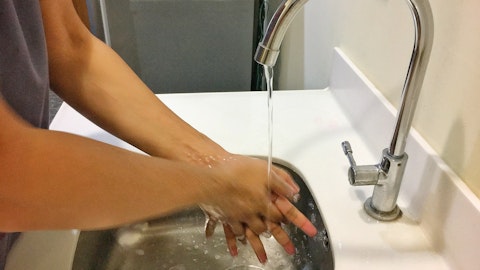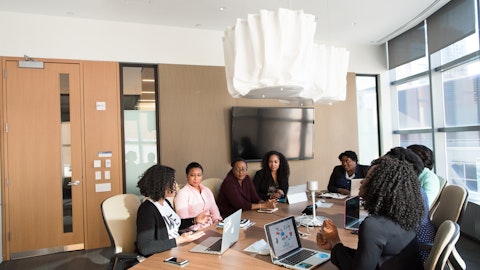Tandy Leather Factory, Inc. (NASDAQ:TLF) Q3 2022 Earnings Call Transcript November 15, 2022
Tandy Leather Factory, Inc. beats earnings expectations. Reported EPS is $0.09, expectations were $-0.08.
Operator: Good morning, everyone, and thank you for joining us for a discussion of Tandy’s Q3 Financial Results. I’m Dan Ross, General Counsel and Corporate Secretary for Tandy, and I will be moderating the discussion today. Our CEO, Janet Carr, will give a brief overview of the quarter, and then we will open it up for questions and discussion. If you wish to ask a question or make a comment, message me, Daniel Ross directly in the chat, and I’ll ask you to unmute your line when your turn comes. You can join the chat on the tool bar. When I ask you, you will need to accept the prompt to unmute yourself, I will not be reading questions or comments directly from the chat unless asked. With that, let’s get started. Today’s presentation will include statements other than historical results that constitute forward-looking statements within the meaning of the Securities Act of 1933 and the Securities Exchange Act of 1934, each as amended.
These statements reflect our expectations or estimates based on the information we have today, but are not guarantees or predictions of future performance. They involve known and unknown risks, uncertainties and other factors, many of which are beyond our control and which may cause actual results to differ materially from the statements contained in this presentation. You are cautioned not to put undue reliance on these forward-looking statements. The company assumes no obligation to update or otherwise revise these forward-looking statements, except as required by law. And now I’ll turn it over to Janet.
Janet Carr: Thanks, Dan, and thanks to all of you for joining us today. Overall, it was a good quarter for us, putting us back on track for profitability. Although sales were down 1.2% over Q3 of last year, improved gross margin and operating expense discipline resulted in $1 million in operating profit for the quarter and $1.5 million in adjusted EBITDA, adjusting for non-cash items such as depreciation and stock-based compensation, as well as interest, taxes and onetime expenses related to the restatement. Cash was down to $3.1 million from $5.6 million at the end of Q2 due mostly to paydown of accrued expenses and liabilities and capital expense associated with our new web platform. While the end of Q3 is usually our high point of inventory for the year as we built for Black Friday and holiday at $42.3 million in inventory at the end of Q3 this year, were down $1.4 million compared to the end of Q3 last year as we adjusted our buys to reflect the lower trend of sales.
On a year-to-date basis, sales are down 2.2% versus last year. Gross margin is 58.7%. Operating income is $1.1 million, and adjusted EBITDA is $3 million. Sales in Q3 were down 1.2% to last year, slightly worse than the less than 1% decline we saw in Q2. The retail and wholesale environments remain challenging due to inflation, worries about recession, war, public health a long list. As we reported last quarter, we closed one door in March of this year, our San Bruno, California store and in July, the Oxnard, California store. We also closed our Miami, Florida store in October of this year. All of these stores had negative 4-wall cash flow and some combination of high rents, expiring leases and/or other nearby stores that could pick up sales.
We evaluate these in a number of other factors when determining whether to close existing stores or open new ones. Retail channel share remained flat year-over-year, but the proportion of sales coming from e-commerce grew while commercial sales declined. Our commercial customers, mostly small to medium businesses, making consumer products are suffering from the effects of the economic environment. We believe our e-commerce business benefited from a number of factors, including our continued optimization of digital marketing, especially in Canada, but may have also had some small impacts from our closed stores and high gas prices through the quarter. Furthermore, in particular, in our retail stores, we’re seeing customers purchase more at full price and less on sale.
We believe this is a result of our everyday low price strategy, continuing to resonate with customers as we’ve been talking about for the last several quarters. We’re refining and evolving our promotions, they are still extremely important in driving traffic, excitement and sales, but we’re also pleased with the consumer response to our improved proposition. That said, we expect the retail environment will remain challenged by the many external forces at play right now and into the foreseeable future and more about that in a moment. Q3 gross profit dollars came in 4.6% above last year on 1.2% lower sales with over 300 basis points improvement in gross margin rate. The higher gross margin rate reflects a combination of factors, the better full price selling that I just mentioned, the modest price increases that we’ve been taking in response to significantly increased product-related costs and the channel shift, more sales came from e-commerce, our highest margin channel unless from commercial, which has lower gross margins.
On a year-to-date basis, gross profit is down 1.5% to last year with margin rate up 40 basis points. Better gross profit, combined with a 4% decline in operating expenses over last year helped deliver $1 million in operating income and $1.5 million in adjusted EBITDA. On a year-to-date basis, we’re still behind last year’s operating income by $0.6 million, but this quarter has helped us make up some growth. We introduced you in our last quarterly call to the key principles that we use to manage the business. So just briefly summarizing from a financial perspective, disciplined capital allocation, meaning capital investments to be funded from operations, two, conservative balance sheet, caution about leverage, three, focus on long-term shareholder value with consideration for all mechanisms for increasing value without impairing the long-term prospects for the business.
And then from an operating perspective, number one, primarily focused on the consumer proposition, quality, value consistency, service. Number two, build a durable business foundation and operating model, the talent, systems, processes that can support the business for many years to come, and three, but that can remain flexible and nimble that can both scale and allow us to respond to changing market conditions quickly. And we believe we’re in a period of time right now that requires that flexibility and nimbleness. With inflation in the U.S. remaining high and the possibility of recession next year getting higher with China COVID lockdowns continuing to disrupt the global supply chain and with Europe already seeing significant economic fallout from the war in Ukraine, we would be prudent to assume that the economic headwinds we’ve been facing this year will continue and possibly even accelerate into next year.
Our plan to weather what could be a very challenging environment of declining consumer demand is to shift our focus to growing profit and cash under the assumption that things will get worse. This means pausing or slowing our investments in driving sales growth for now with a focus on what’s necessary to hold on to the gains we’ve made in improving the consumer proposition and building the foundation for the long term. While the opportunity for sales growth across these four initiatives remains that we talked about in our last quarterly call, our near-term focus will be on managing the core business for financial sustainability, maintaining profit and growing cash even in the face of possible declining demand. This will be primarily through optimizing our gross profit dollars, responding to our customer sensitivity to regular retails and promotion to maximize profit dollars and by trimming operating expenses to the minimum necessary to run the core business without damaging our long-term prospects.
We’ve already begun seeing the potential for this shift in Q3. And while Q4 tends to be unique, we are building our 2023 plan with this focus. Now moving to questions and discussion. If you wish to ask a question or make a comment, message Daniel Ross directly in the chat, and he will ask you to unmute your line. You can join the chat on the tool bar when you ask you, you’ll need to accept the prompt to unmute yourself.
A – Dan Ross: Okay. No questions in the chat queue so far. So please go ahead and send me a message. Okay, here is the first one. And this question comes from Eddie Riley. Please unmute yourself and go ahead and ask your question.
Unidentified Analyst: Hi, guys. I have two questions. I’m curious if you’re able to give some more details on the Fort Bragg store. Why that location, how much does cost to build out and maybe what you’re expecting in free cash flow in the store?
Janet Carr: We – I can tell you that we are excited about the opportunity in military bases. It’s a test for us. It is the first one, and we are being cautious. We went in with a very low build-out. We used a lot of what was already there. And we’re looking to see what we can do. We have a very strong base of military customers. And if this is any sign and it may or may not be, but as they were setting up the store, we had a lot of interest from people who were just passing by and super excited to see us there. It also gives us access to rehab facilities there on site. I think there are something like seven of them at Fort Bragg. So I think there are lots of possibilities, and we’re really seeing it as a test of what this can be going forward.
Q&A Session
Follow Tandy Leather Factory Inc (NASDAQ:TLF)
Follow Tandy Leather Factory Inc (NASDAQ:TLF)
Receive real-time insider trading and news alerts
Unidentified Analyst: Okay. Got you. And the second one for me. Nice to see operating expenses decreased even relative to adjusted operating expense in the second quarter. It seems like a lot of that’s driven by the bonus expense reduction. I’m wondering if you could provide a little bit more color there, who’s typically getting this, how they’re incentivized? And why it’s decreased so much, just given the performance.
Janet Carr: Yeah. Retail store employees are bonused on sales comp, right now and have been for the last year or so and corporate employees have a combination of factors. And you know, we continue to bonus the retail employees as they deliver comp, which is variable, but overall as it is down, the total dollar amount is down. And of course, this year, we’re not expecting for the corporate employees bonus.
Dan Ross: Our next question comes from George Baister, who asked me to read it for him. He says, with cash balance lower, how is Tandy approaching share repurchase?
Janet Carr: Yeah, great question. As this is the low point in the year for our cash balance, we are pausing on our share repurchases. We still think we’re a great value at our recent and current share price, but we will be rebuilding our cash balance through Black Friday and holiday and the Board will be re-evaluating share repurchases in the future.
Dan Ross: Our next question comes from Andrew. Please unmute yourself and ask your question.
Unidentified Analyst: Hi. How is employee turnover and morale currently?
Janet Carr: Employee turnover is down versus last year. Morale is quite good, but you’re probably asking the wrong person. That’s probably the answer I’m going to give you. We do measure this, and we do measure turnover regularly, and we’ve been working hard at improving our turnover especially in this recent period of time with unemployment really low and hiring being very challenging. And Tandy is not on the highest end of wages that we pay especially for retail employees, and we’ve built a lot of non-monetary benefits into the packages for those employees, and that seems to be working.
Unidentified Analyst: Great. And also, what are the most important competitive dynamics that you’re currently addressing and winning the customer over?
Janet Carr: Yeah. Good question. We are continuing to face the challenges of the fragmentation of online players, although that is reduced, as what I would call the Amazon effect has been reduced. A lot of those folks who are selling on Amazon are suffering on their businesses. So I think that’s been a bit of a benefit to us. But otherwise, it’s just the normal blocking and tackling being in there and having great service, good product. And for our customers, in particular, this category tends to be price and promotion sensitive, continuing to be vigilant about where we can take price increases relative to our competition, to help mitigate the cost increases that we’ve seen and where we can be aggressive about staying on top of our competitive pricing, which has been a hangover from many, many years in the past when we were not particularly price competitive.
Unidentified Analyst: Okay.
Dan Ross: I will read another question from George Baister, who asks what inflation level is Tandy seen for its inventory less than the national rate, greater or equal. In general terms, please, I know there are a lot of SKUs.
Janet Carr: I think you’re asking the question of how much has the value of our inventory increase sort of per unit. I’m sorry, I’m not able to answer that question. We have seen significant price increases and where the increases come up across essentially all the SKUs is, in particular, in the transportation costs, freight and warehouse, boxes, things like that, that all get capitalized up into our inventory value. That’s where we’ve seen the really big increases. There’s always mix as well, which becomes very challenging as we bring in higher priced items, it’s difficult to kind of tease out, which is coming from mix versus absolute price increases. But some categories of product that’s capitalized like boxes, for example, have increased over 100%.
So – and we all know that freight and fuel surcharges on freight have also increased really dramatically. Vessels coming from Asia, for example, have increased 300%. So those are the areas where we’ve seen really significant increase. I can’t tell you what it is overall though.
Dan Ross: Next is a question from Eric Speron, which he asked me to read. He says, nice job getting the gross margin back through 60 In the context of the drivers, full price sell-through is self-evident, but can you talk about the impact of proprietary products in e-commerce? What percentage of sales are they now? And what is a good 24-month goal?
Janet Carr: Yeah. E-com, as we said in the presentation, is now at 18% of sales, and we are – it’s a little bit of accounting because e-commerce shipping is included in sales and the shipping out to customers is included in operating expense. It creates kind of this artificial higher gross margin for web. Sorry, other parts of your question around what’s the mix of proprietary brands, those would be Tandy brands that we’ve been rebuilding and I don’t have that number off the top of my head, maybe somebody on the team can dig that up while we’re talking. But those have been increasing, and we’ve been improving the margins where we can with that mix.
Dan Ross: And Eric had asked about a 24-month goal for that.
Janet Carr: I’m sorry for how much €“ Yeah, we don’t have a number for that for 24 months. But for us, it’s not about hitting a number for those brands. It’s really about providing the mix that is both meeting our financial goals around the mix for the margin, but more importantly, the things that customers really want to buy. We have a lot of items that are lower gross margin that are branded items that are really meaningful to our customers, leather machine called the cobra sewing machine are among our lower margin items, but they have been very important in terms of driving sales and demand and traffic, and they also contribute to the perception that Tandy has things that customers want to buy. So it’s about really managing the mix of those things.
Dan Ross: I will also read the next question, which comes from Mike C. He asks, is the overall industry for leather craft growing in 2022? Do you see more people joining this hobby?
Janet Carr: I’m sorry, I’m getting a million answers from my team on proprietary products. Do you want me to – let me check that real quick and see what they said. Yes, Yes. So especially with regard to kits, that’s an area that has been growing very significantly, where our margins are much improved. And we’re estimating those to be in the 15% to 20% range. So I’m sorry, can you repeat the next question again, Dan?
Dan Ross: Yes. Mike’s question was, is the overall industry for leather craft growing in 2022? And do you see more people joining this hobby?
Janet Carr: Yeah. You know, crafting in general has been growing. I think that we are not taking a measure, a quantitative measure of where the category is as the leader in the category, sort of as goes to Tandy, so goes the category. So we’re definitely – we’ve definitely seen dampened consumer demand in the category. But the long-term trend is for crafting in general and for leather crafting specifically is very positive.
Dan Ross: Okay. If anybody else would like to ask a question, please send it to me in the chat. Right now, there’s nothing in the queue.
Janet Carr: I’ll give you a second. I do want to come back to the Fort Bragg question for a moment. While people are thinking about if they have other questions. The other thing that’s unique about the Fort Bragg model is that rent as a percentage of sales. So as your sales get bigger, that’s not necessarily the greatest thing, but to get started, it actually is a very, very low risk. In addition, it is a very low time commitment. So this has been a really, really low cost way for us to get in with some of our highest affinity customers for a very low cost. And we will be – potentially, they’ve come to us and ask us to be in a number of other military bases, and we’re going to see how this goes. And I think that it could be a model that quite successful for us longer term.
Dan Ross: We have one more in the queue, again from Mike C, who asks what should be the long-term net margin for the business?
Janet Carr: We’re not providing long-term guidance. We’ve talked about our long-term goal to get to $15 million to $20 million in operating income and $100 million in sales. But given the current economic headwinds, clearly, that’s not going to be happening in the next year or so. That’s going to take us longer to really drive forward.
Dan Ross: Okay. Okay. And one more from Eric Speron, who asks on store number 36 – I’m sorry, it’s a little hard to follow on store number, 36-year months out, how do you think our store count at 103 stores a few more or a few less. I’m sorry. He’s asking – yeah, he’s just ask €“ generally 36 months?
Janet Carr: Okay. Yeah. I – look, we are closing stores incrementally as for the negative cash flow stores that have leases expiring or we can get out of them, nominally. They are really only one or two stores at right now today that we think have the potential to be negative cash flow in the near future. So I’d like to see us stop closing and the reason we close is because they’re not doing well economically. So obviously, I’d like to see us stop closing. But I would also like to see us grow some stores, not dramatically, but because they need to be cash flow positive. This is a big use of operating expense for us. And we need these stores to be delivering positive cash flow. So that’s why I’m optimistic about the opportunity to test a new format in Fort Bragg, where the economics could be more attractive, honestly, potentially.
So – and we will be – we are constantly seeking other potential locations, but we’re also being very cautious about where we’re making these investments. So I didn’t – I’m not going to give you a number, Eric, but that is to say, I don’t expect it to be continuing to decline, and we would like to see it increase nominally.
Dan Ross: Thanks. One more from Eddie Reilly. Eddie, you please unmute and you can ask your question.
Unidentified Analyst: Thanks. Janet, with Fort Bragg is the test store for military bases, if this works out well, will future stores on military bases also have rents tied to sales?
Janet Carr: That’s the way AAFES, who is the Army, Air Force Exchange Service. I think that’s what AAFES stands for. They run all of the retail concessions on Army and Air Force bases that is their model. It is a percentage of sales model. And it really all comes down to what’s that rate that you negotiate because they are negotiated. They’re not to rigid. And I think that we – what we’re hoping for is getting to a tiered sort of approach with them. But the positive of it is that it allows you to get in fast to get out if it’s not working and to really test.
Unidentified Analyst: Yeah. Could you maybe give us an indication of the rate that you negotiated with Fort Bragg?
Janet Carr: Yeah, it’s 8%.
Unidentified Analyst: Okay, great. Thank you.
Dan Ross: That is all we have in the queue now
Janet Carr: All right. Well, as always, you can message us individually. And thank you again for joining, and we’ll see you next quarter.
Follow Tandy Leather Factory Inc (NASDAQ:TLF)
Follow Tandy Leather Factory Inc (NASDAQ:TLF)
Receive real-time insider trading and news alerts





